In a sense, all of the vitamins, minerals, and herbs that I discuss on this site are brain enhancing supplements. When we replenish our systems with nutrients, we are helping to normalize our brain chemistry and thereby achieve cognitive recovery.
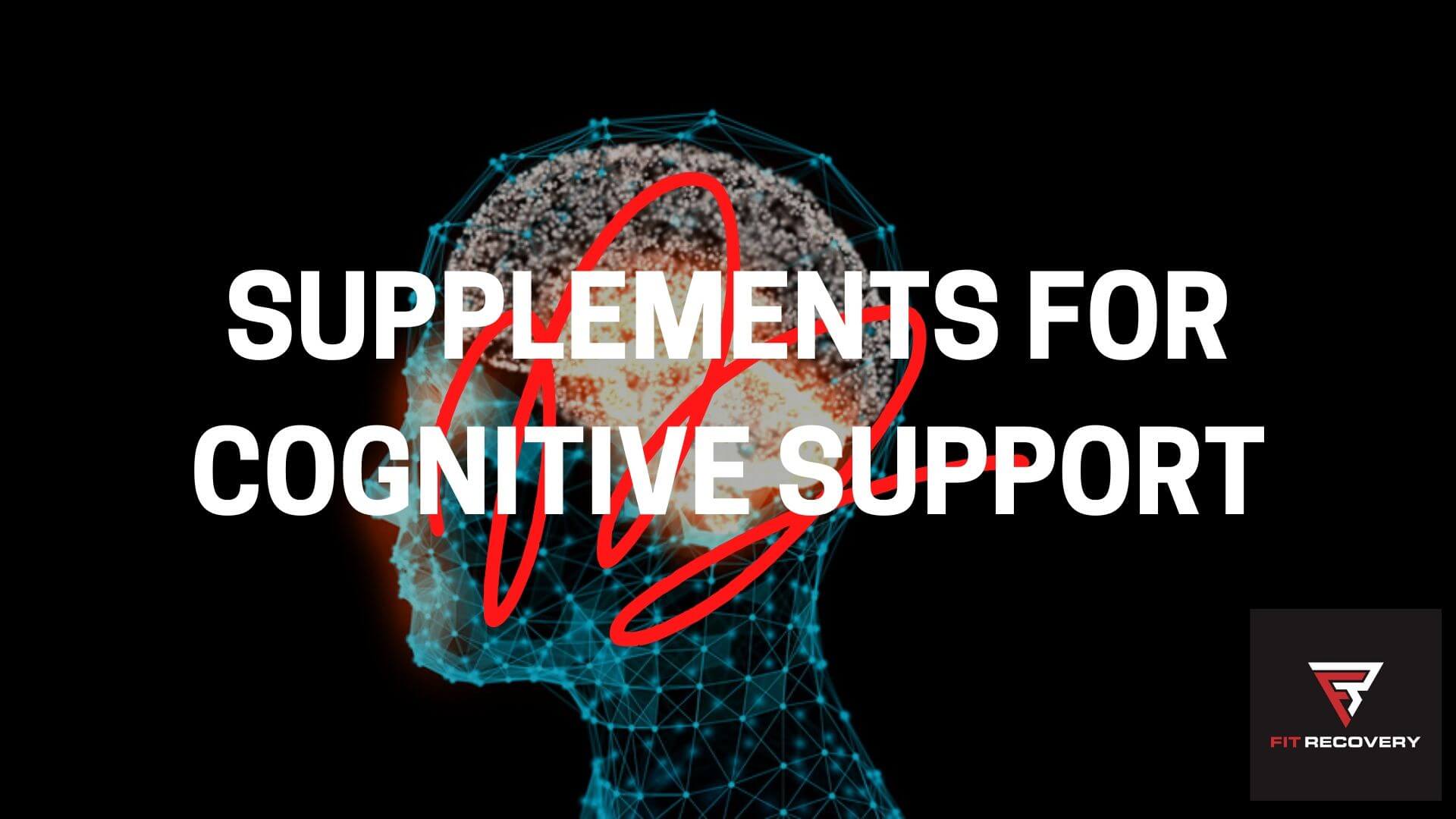
Amino acids are building blocks for neurotransmitters. Vitamins and minerals serve a myriad of functions, especially as cofactors for enzymes that regulate neurotransmission and our complex metabolisms.
Herbs can also be beneficial for brain support, since they are gentler alternatives to harsh medications. The most effective herbs have been tested by thousands of years of experience, which I find to be at least as compelling as 6-month drug studies funded by Big Pharma.
“A stable mind is impossible without a balanced brain.” -Dr. Linus Pauling, Nobel Prize in Chemistry
Do They Really Help?
I know that I would not be where I am today – with years since I last had a drink, zero alcohol cravings, and a profound sense of inner peace and happiness 90% of the time – without supporting my brain with high-quality supplements. This is why I would like to discuss some very effective options in this article, including:
- 5-HTP – Natural amino acid building block for serotonin (and in turn, melatonin)
- Mucuna Pruriens – Herb that contains L-Dopa, the natural precursor for dopamine
- L-Theanine – Amino acid found in green tea that inhibits stress chemicals like glutamate and cortisol
- Phenibut – Synthetic derivative of GABA that can be very useful for anxiety and sleep in small doses
- Valerian Root – Herb that enhances the signaling of GABA, the brain’s “natural Valium”
All of the above mind (and mood) boosters above are natural compounds, except for phenibut, which is a synthetic supplement that I found to be especially helpful for occasional mood support after quitting drinking.
After reviewing how these compounds can improve your brain chemistry and enhance your overall sense of well-being, I will give you my personal opinions on a few of the highest quality brands for these.
1) 5-HTP
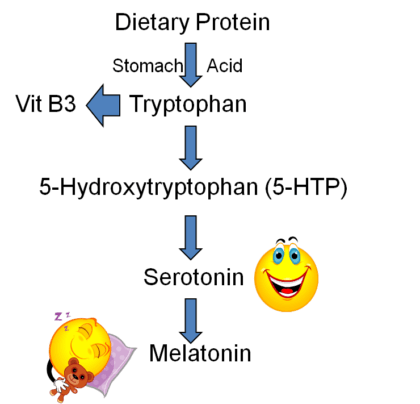
Many people are deficient in serotonin, which is a neurotransmitter associated with relaxation, confidence, and sound sleep. When you take 5-HTP in supplement form, your brain uses it as raw material to produce more serotonin. Many people including myself have found 50 mg of 5-HTP to be useful for short periods of time to help with sleep.
Antidepressants called SSRIs (“selective serotonin reuptake inhibitors”) artificially increase the concentration of serotonin between synapses. This can lead to relief from depression, but it does not actually increase the brain’s supply of serotonin. Moreover, SSRIs often cause dependence that can be very hard to break.
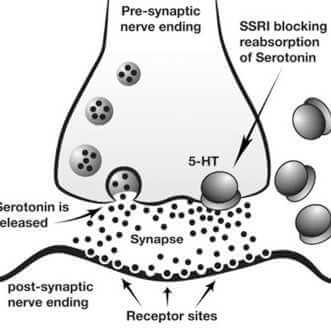
5-HTP may be useful for sleep, cravings, weight loss, and panic disorder. (source) Importantly, 5-HTP should never be combined with antidepressants. You don’t want to increase your levels of serotonin AND increase the concentration of serotonin at the same time. Doing so can result in a condition called serotonin syndrome, which can be fatal.
Note: Because serotonin competes with dopamine and norepinephrine in the brain, 5-HTP should be taken along with precursors to these catecholamines.
2) Mucuna Pruriens
Mucuna pruriens – also known as “velvet bean” – contains a natural form of L-Dopa, which is the precursor to dopamine. Dopamine is a neurotransmitter associated with motivation, reward, and learning. Research has shown that mucuna pruriens can be useful for reducing stress, treating male infertility, and increasing sense of well-being. (source)
I personally had AMAZING results from using mucuna pruriens after I quit drinking. Alcohol releases a lot of dopamine for heavy drinkers, and I had clearly depleted my supply of this important neurotransmitter.
Taking mucuna pruriens helped me to feel more motivated, interested in life beyond alcohol, and it even aided in a better night’s sleep.
Because not all forms of depression are caused by serotonin deficiency, it’s important to consider whether you might have sub-optimal dopamine levels. Taking mucuna pruriens along with 5-HTP can help you restore serotonin and dopamine without depleting either of these important neurotransmitters.
3) L-Theanine

This amino acid crosses the blood brain barrier and plugs receptors for glutamate, which is a neurotransmitter associated with stress and increased electrical activity in the mind.
Unlike glutamate, L-theanine produces a calming effect and improved alertness. Interestingly, L-theanine may have a long-term protective benefit for cells, since many neurodegenerative conditions have been linked to excitotoxicity caused by high glutamate levels. (source)
I have discussed elsewhere on this site the seesaw-like relationship between GABA and glutamate, which balance each other out in a healthy mind.
People suffering from intense stress or alcohol withdrawal tend to be overloaded with glutamate and deficient in GABA.
L-theanine is the natural compound in green tea that balances out the caffeine buzz, leading to a zen-like sense of relaxation. L-theanine reduces levels of cortisol, which is a stress hormone, and has been found to reduce abrupt blood pressure spikes in people who are experiencing stress.
For several months, I took L-theanine every day to help me wind down before bed at night. It worked really well for this purpose. It will not get you high, but combined with a strong cup of chamomile tea or other options on this list, L-theanine is a very effective method to help take the edge off after a long day.
4) Phenibut
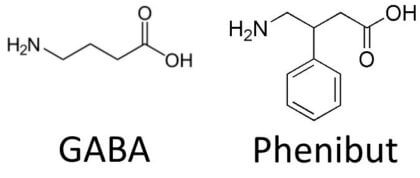
Phenibut was invented in Russia to help astronauts stay calm during launch time. Unlike most drugs that stimulate GABA receptors powerfully, phenibut does not tend to cause drowsiness. In low doses, it aids in relaxation, but does not act as a sedative on its own. (source)
GABA is a very important chemical, but pure GABA supplements cannot cross the blood-brain barrier. Phenibut is chemically similar to GABA, but contains a phenyl ring, which allows it to be absorbed into the brain. This supplement primarily activates GABA-B receptors and produces immediate effects:
- Sense of calm
- Carefree attitude
- Enhanced sociability
- Improved cognition
Phenibut provides a mild dopamine boost, which may account for the last two effects above.
Phenibut is an amazingly useful GABA booster in small doses, but care must be taken to avoid becoming dependent on phenibut. Dependence can occur at a sustained daily dose of 1 gram per day.
When I take phenibut for long airplane rides and infrequent social events, I use about 100 mg (a very low dose). I find that the pleasant effects last for about 12 hours and wear off imperceptibly.
I once took about 250 mg of phenibut for four days in a row, and I noticed that I felt “too relaxed” and somewhat drowsy. This issue went away within a day of stopping phenibut.
5) Valerian Root
Valerian root positively affects the signaling of GABA, and has been shown to both extend the duration of sleep and improve sleep quality. (source) Scientists believe that valerian works by increasing the amount of GABA that is released in the brain, as well as by inhibiting the reuptake of GABA.
Valerenol and valerenic acid are the natural compounds in valerian root that account for its anxiolytic (anti-anxiety) effects. These compounds also moderately lower blood pressure, which may reduce the risk of stroke and offer a neuroprotective effect.
Many people use valerian simply to relax, but I have personally found that the sedative effects are too strong for me to use it in this way. I have only taken valerian at night in order to help me sleep. I have never had trouble falling asleep after taking valerian, although I have felt groggy in the morning after taking more than one capsule.
Many people swear by valerian as an anti-anxiety aid and natural sleep aid wrapped into one. I seem to be an outlier in that I had better results with L-theanine than I did with valerian.
Is There a Pill to Enhance Your Mind?
If you have been following Fit Recovery for some time, then you will be familiar with all that I’ve discussed above. You will also be familiar with Sleep Support, which is my favorite sleep aid for occasional use and which contains all of the above except for mucuna pruriens and phenibut, the latter of which is no longer available in supplement blends.
You can read one of my early articles about my experience in early recovery with mucuna pruriens to learn more about this helpful compound.
Since nutrients often work together – for example, the production of neurotransmitters like GABA require vitamin B6 – I would take the above options with a potent and pure nootropic for best results. My favorite nootropic is currently Oweli Neuro, which is basically a turbo-charged multivitamin and nutrient blend for the brain:
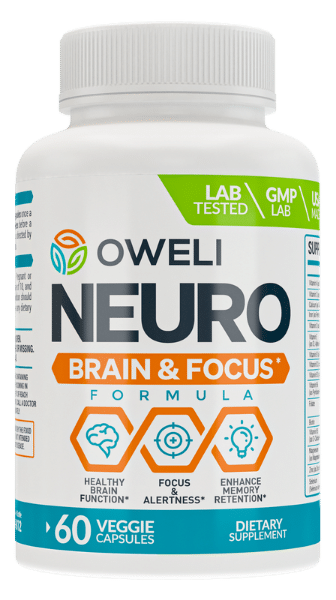
Unlike other nootropics, Oweli Neuro doesn’t contain any harsh drug-like compounds. But it does contain many cutting-edge ingredients in its blend, including Huperzene A, Phosphatidylserine, and DHA. When I take this supplement, I feel sharper and “in the zone” almost immediately. But I don’t feel jittery, as I often do with other vitamins that contain large amounts of stimulants or caffeine.
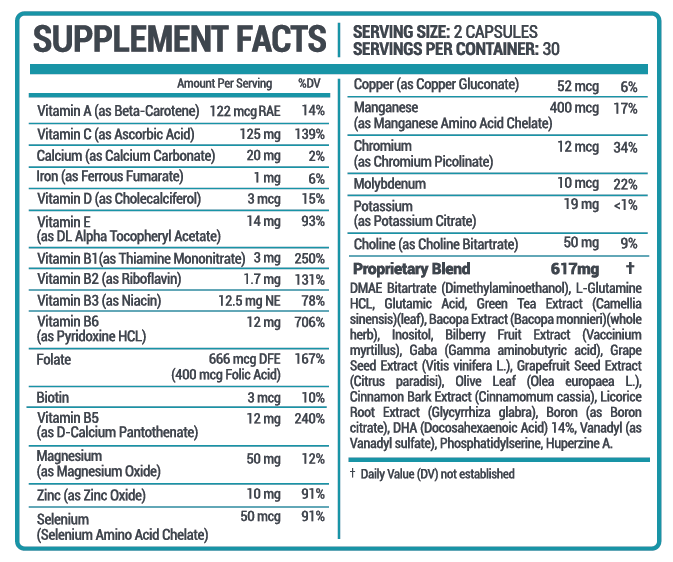
If I were looking to regain mental sharpness and activate my “inner genius” after quitting drinking, I’d definitely try out the above! Since everyone is different, there’s always some intelligent experimentation with supplementation. But when you find a combination of compounds that work for you, you’ll be paid back many times over with improved mood, cognitive function, and life-changing productivity.
What is the Best Supplement for the Brain?
Because everyone is biochemically different, there is no single best supplement for supporting brain health. The problem of optimizing brain health is best approached holistically, which first involves repairing deficiencies in nutrients, neurotransmitters, and hormones. This might involve cleaning up your diet, taking certain vitamins, and lifestyle practices such as meditation, exercise, yoga, and getting sufficient sleep.
After you do the basic work of naturally optimizing your baseline brain health, you can look into supplements devised specifically for supporting cognition.
I have always been somewhat skeptical about nootropics, but I think that most people suffering from stress or a heavy-drinking lifestyle can really benefit from what we’ve just covered. Because everyone is biochemically different, it’s quite likely that you might like some of these more than others.
Over the past several years, I’ve tried dozens of different supplements, always doing my research beforehand. I simply returned the ones that didn’t work for me. Among the products that have helped me, a few have played an integral role in my health and mood as I’ve transformed my life.
If you have any questions, please leave them in the comment box below.

Authors
-
Chris Scott founded Fit Recovery in 2014 to help people from around the world dominate alcohol dependence and rebuild their lives from scratch. A former investment banker, he recovered from alcohol dependence using cutting-edge methods that integrate nutrition, physiology, and behavioral change. Today, Chris is an Alcohol Recovery Coach and the creator of an online course called Total Alcohol Recovery 2.0.
View all posts -
Dr. Rebeca Eriksen is the Nutritional Consultant for Fit Recovery. She has a PhD in Nutritional Genetics from Imperial College London, and over ten years of clinical experience designing custom nutritional repair regimens for patients recovering from alcohol addiction. In addition to her work at the exclusive Executive Health clinic in Marbella, Spain, she helps to keep Fit Recovery up to date with emerging research.
View all posts







Hi Chris ( and Team), I have enjoyed reading your videos and book. I have been off the ‘grog’ for about 7 weeks now. I am generally doing really well, however I have had morning headaches/ throbbing tinnitus since giving up.. I was wondering if a gaba or l theanine supplement would help? I also tried to give up caffeine, but felt flu~like symptoms, so re introduced a cup a day in the morning and a cup of matcha mid morning, then herbal tea and cacao in the afternoon. I’m eating pretty well and taking a b multi, d3, fish… Read more »
What are the dosages you recommend with 5htp and Mucuna? Do you take one during the day and one at night?
Hi Jim, 5HTP is typically taken in doses of 100 – 200 mg to assess tolerance, but mega-dosing regimens under the care of a functional medicine doctor can involve multiple grams per day. As for mucuna, it depends on the concentration/extract – I benefited from 1 capsule per day of the Ketter Wellness brand.